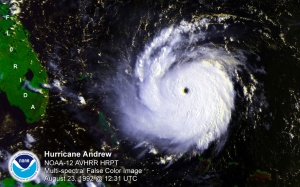El Nino on the Rise? The Fate of the Hurricane Season Awaits
Today (June 1) marks the beginning of the hurricane “season” in the North Atlantic ocean, in which the ocean and atmospheric conditions are generally the most favorable for creating tropical storms. There is always a little bit of curiosity as to how active the year will be and many groups now produce seasonal forecasts of activity (something we have discussed here in the past). Most forecasts for this year predict a less active season because of the potential development of El Nino.
A Quiet Hurricane Season in the Atlantic?
The official start of the hurricane season in the North Atlantic was June 1 and most experts are predicting a relatively quiet season, pointing to relatively cool water temperatures in place and a developing El Nino in the Pacific. El Nino can be thought of as a substantial warming of ocean water in the central and/or eastern Pacific which in turn alters global weather patterns. Atlantic hurricanes typically encounter more hostile atmospheric conditions during El Nino events, limiting their potential to develop and strengthen. Most of the inactive seasons in the Atlantic over the past 20 years have occurred during El Nino events. Read More…
Seasonal Tropical Cyclone Forecasts Are Coming In – But Are They Worth It?
Citizen scientists working on Cyclone Center are working with a few thousand tropical cyclones which have developed since 1978. Beginning just a few years later, Dr. Bill Gray at Colorado State University (CSU) first began issuing forecasts for the number of tropical cyclones that will develop in the Atlantic Ocean for the upcoming Atlantic season (June 1 – November 30 each year). Since that time, several other groups, including the U.S. National Oceanic and Atmospheric Administration (NOAA), have also developed similar techniques to predict seasonal activity. With the official start of the Atlantic season just a couple of weeks away, this year’s predictions are in.

Hurricane Andrew, a devastating Category-5 storm, occurred during an extremely quiet Atlantic hurricane season.
The CSU forecast, issued in April of this year, predicts 18 named storms (those achieving at least Tropical Storm strength), 9 hurricanes, and 4 major hurricanes (Saffir-Simpson Category 3 or higher). This is well above the long-term average for the Atlantic. The NOAA forecast, which relies on similar parameters to predict activity (e.g. warm ocean temperatures, El Nino phase), puts the chances of an active season at 70%. Groups in other parts of the world also produce seasonal forecasts for their own region. For example, the Bureau of Meteorology in Australia issues a national as well as regional seasonal outlooks. Recently, other groups such as the United Kingdom Met Office have begun issuing “dynamical” forecasts, which explicitly count tropical cyclone-like features in weather models rather than relating environmental conditions to past activity.
Seasonal forecasts receive quite a bit of publicity, despite questions about their skill and usefulness. Statistical schemes such as the CSU forecast, rely on past connections between environmental factors and TC activity. They fail especially in predicting extreme seasons, such as the 1995 or 2005 Atlantic seasons, because the models just don’t know about hyperactive years like that. Dynamical predictions, which theoretically can predict record breaking years since they do not rely on past seasons, have been shown to have better predictive skill than statistical techniques for seasonal TC prediction.
But even if a model were 100% accurate, would it really make a difference? The majority of systems that do develop into tropical cyclones do not affect land. Predictions of landfall are made by several groups but have not shown any skill so far. For any given location of coastline, the chances of a TC impact in any given year are very small. So if a homeowner hears that the upcoming season will be active, should any action be taken? Does it really matter if we’re going to get 12 storms this year or 11? Remember that some of the most devastating hurricane events in U.S. history, such as Andrew in 1992,, occurred during inactive seasons. In the end, how do seasonal forecasts help society?
One could argue that any publicity that gets people to assess their readiness is good – but I think that most will not do anything. Perhaps more effort should be invested in determining how the nature of tropical cyclones will change in our warming world. Cyclone Center is going to provide researchers with new data that will help determine if and by how much the nature of global tropical cyclone activity has been recently changing. With stronger tropical cyclones predicted in the Atlantic and other parts of the world – along with rising sea levels – time and energy is better spent developing plans for mitigation for the big ones rather than issuing forecasts with little or no value for coastal residents.
– Chris Hennon is part of the Cyclone Center Science Team and Associate Professor of Atmospheric Sciences at the University of North Carolina at Asheville
